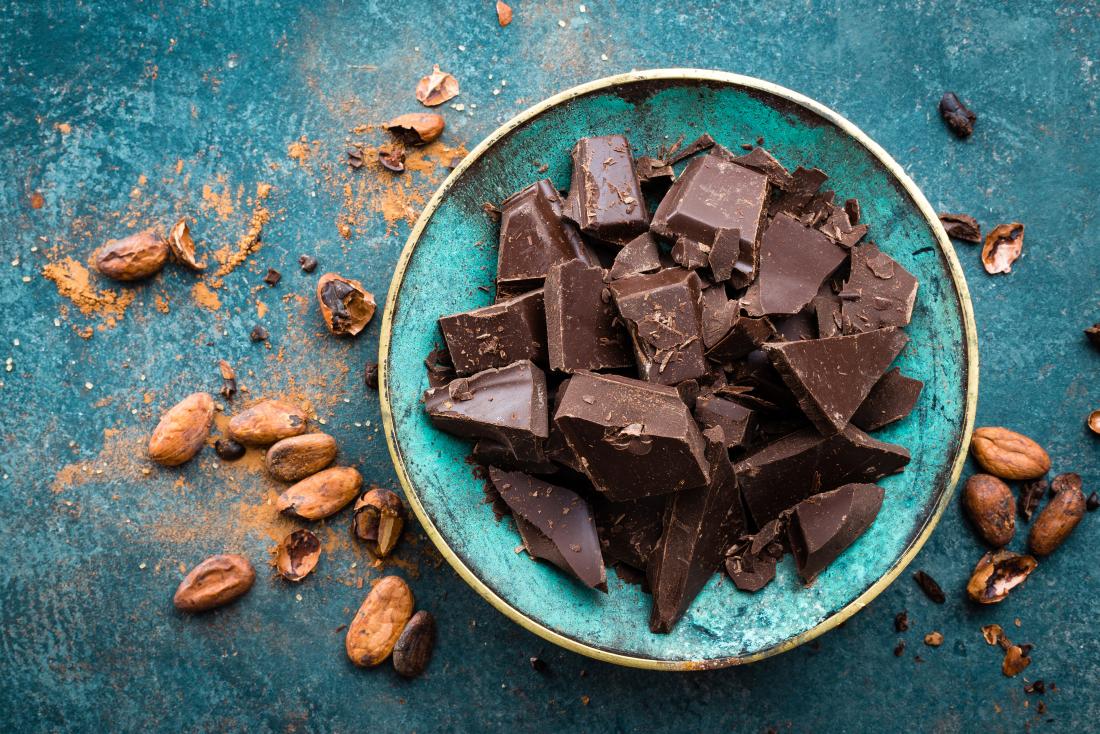 A one-ounce portion of white chocolate contains just 50 milligrams of phosphorus. You have to choose your chocolate products wisely if you want to support your health. These have antioxidant properties and may also have other functions that can help you out but be warned: while pure chocolate is antioxidant-rich, chocolate products with a lower percent of chocolate liqueur are far lower in phytochemicals. But we can say that eating more polyphenol-rich foods appears to correlate to a lower risk of chronic disease.
A one-ounce portion of white chocolate contains just 50 milligrams of phosphorus. You have to choose your chocolate products wisely if you want to support your health. These have antioxidant properties and may also have other functions that can help you out but be warned: while pure chocolate is antioxidant-rich, chocolate products with a lower percent of chocolate liqueur are far lower in phytochemicals. But we can say that eating more polyphenol-rich foods appears to correlate to a lower risk of chronic disease.
The result is a lower risk of oxidative stress and free radical damage--both of which contribute to aging, cancer, and disease. As long as you choose flavonoid-rich dark chocolate, the sweet treat could have a number of beneficial effects on health, including lowering your blood pressure and your risk for heart disease. If you have diabetes, you should limit egg consumption to three a week.
One relatively harmless and healthy egg can be made a little less healthy if it’s fried in butter or unhealthy cooking oil. If you only eat egg whites, you can feel comfortable eating more. Made from the seed of the cacao tree, it’s one of the best sources of antioxidants you can find. Dark chocolate with higher percentages of cacao solids typically contains even less sugar.
For example, even though it makes blood sugar go up slightly, since the rise is small and steady, it’s actually okay to have a couple of cubes of dark chocolate after a meal. Have a rich serving of dark chocolate but restrict the serving to about 21.26 to 28.35 gm. The other products that round out this list - Well Naturally No Sugar Added Dark Chocolate Rich Dark and Lindt Dark Chocolate No Sugar Added - both contain non-nutritive sweeteners in place of sugar.
The complex flavors of dark chocolate pair well with a robust red wine like Shiraz or Cabernet, which bring out the fruity and peppery notes in the chocolate. Also, add nuts like almonds, cashew, and peanuts to increase the total nutritional value of the chocolate recipe. Also, if you want to improve your mental health, eating chocolate is the answer. By giving ourselves permission to enjoy candy from time to time, it loses power over us and we remain in control of our health, kidneys, and all!
Anything that is labeled chocolate but is really just a candy or dessert needs to be avoided. 1.Avoid candy and sweets. These almost always contain very small amounts of actual cocoa bean and are super high in sugar, carbs, and other unhealthy additives. Brownies and chocolate cake and cookies have flour, sugar, and eggs. But to make chocolate, sugar, chocolate liquor, cocoa butter, vanilla, and milk are combined. Cocoa has phytochemicals known as flavanols, according to Linus Pauling Institute.
Cocoa and dark chocolate have a wide variety of powerful antioxidants. High-quality dark chocolate shouldn’t have any milk added to it. The perfect crunchy, chocolate snack with 10g of protein per 2/3 cup serving. Dark chocolate has a glycemic index of 23, and milk chocolate has a glycemic index of 42. These are both within the low range because they are below 55. When serving size is taken into account to determine the overall glycemic load, however, dark chocolate has a clear advantage.
However, there is presently stronger evidence for an insulin-sensitizing effect mediated by altered glucose metabolism and changes in endothelial function . The composition of a food, the portion size you eat and when you eat it can all make a difference in the effect of a food on your blood sugar levels. But what we'd today think of as dark chocolate likely hit full tilt during Mayan times, when it was used to make drinks for celebrations and medicinal purposes.
Is healthy dark chocolate made differently today? What exactly is chocolate? For people that need to follow a low oxalate diet, chocolate may be a concern. First, the study was quite limited, following just 12 people with Type II diabetes. An Italian study from the University of Rome found that having a regular intake of flavonoids in your diet which ensure better cognitive function within your brain will actually decrease the risk of serious neurocognitive disorders such as dementia.
That way youll get some of the benefits of dark chocolate and satisfy your craving for something sweet, but you wont cross the limits for calories, saturated fat, carb, or sugar intake. Daily cocoa intake reduces the susceptibility of low-density lipoprotein to oxidation as demonstrated in healthy human volunteers, Free Radical Research, US National Library of Medicine, National Institutes of Health.
White chocolate contains no cocoa and is higher in calories and saturated fat than dark or milk chocolate. For example, a 100-gram bar of 85 percent dark chocolate, records around 600 calories, of that 450 comes from fat. Chocolate liquor can be made into cocoa powder if the fat is removed. If you plan to incorporate chocolate into your diet to lose weight, choose dark chocolate that is at least 70% cocoa.